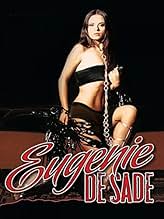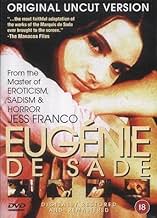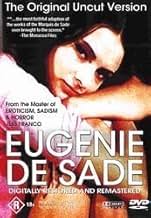After a bashful young woman discovers that her famed wordsmith stepfather is a psychopathic deviant, she becomes an accomplice in his murderous sex games.After a bashful young woman discovers that her famed wordsmith stepfather is a psychopathic deviant, she becomes an accomplice in his murderous sex games.After a bashful young woman discovers that her famed wordsmith stepfather is a psychopathic deviant, she becomes an accomplice in his murderous sex games.
- Eugénie Radeck de Franval
- (as Susan Korday)
- Paul
- (as André Montchall)
- Kitty
- (as Greta Schmid)
- Photo Model
- (uncredited)
- Attila Tanner
- (uncredited)
- Man Whispering to Tanner
- (uncredited)
- Nightclub MC
- (uncredited)
- Nightclub Patron
- (uncredited)
- Director
- Writers
- All cast & crew
- Production, box office & more at IMDbPro
Storyline
Did you know
- TriviaThe shooting started early 1970, just after Count Dracula (1970).
- GoofsWhen Albert enters the room to photograph the model, she sits on the couch twice.
- Quotes
Albert Radeck de Franval: Eugenie, you've just discovered life's deepest purpose: the quest, the grail mankind has sought throughout the ages - ultimate power of human beings. Yes, the power which comes from the pleasure of giving pain. Living each moment with intensity and awareness while they suffer. You'll find out that the key to life is nothing but your own pleasure. You'll be amazed to find out that pleasure is always at someone else's expense. We'll carry this to its ultimate expression through wounds and blood and death. I know you'll love every moment of it. You'll revel in the secret knowledge of having done something savagely beautiful but forbidden.
Eugénie Radeck de Franval: I accept. I'll do absolutely anything you want me to, anything you say. Your will will be mine. We'll act as one. I had a premonition - that life would be full of passions, how it's marvellous what we've become to each other. Father, I promise to obey you.
- ConnectionsFeatured in Nightmares Come at Night: Eugenie's Nightmare of a Sex Charade (2013)
I have to admit that the main reason I was so keen to see this film was due to the fact that it stars the amazing Soledad Miranda. This actress made a number of films with Jess Franco (including two of his best, Vampiros Lesbos and She Killed in Ecstasy) and it's a real shame that she died prematurely as she was a good actress and a pleasure to watch on screen. I have not seen many of her movies unfortunately, but from the ones I have seen - she is at her best in this one. She fits in brilliantly with the sordid tone of the film and creates just the right balance between innocence and sadism. The style of the movie is very European and Franco obviously valued how important it was to ensure that the film is erotic. There are several standout scenes; the best of which sees Soledad Miranda and Paul Muller entertain an Austrian hitchhiker that they picked up in the middle of nowhere. The film is apparently based on the writings of the Marquis de Sade; not having read any of his material, I can't say how faithful it is but there is plenty of sadism in this movie. The plot is strong for the duration and Franco manages a satisfying ending too. Overall, this is among the cream of Franco's crop and comes highly recommended to all Eurocult fans!
- How long is Eugenie de Sade?Powered by Alexa
Details
- Runtime1 hour 26 minutes
- Sound mix
- Aspect ratio
- 1.66 : 1
Contribute to this page











